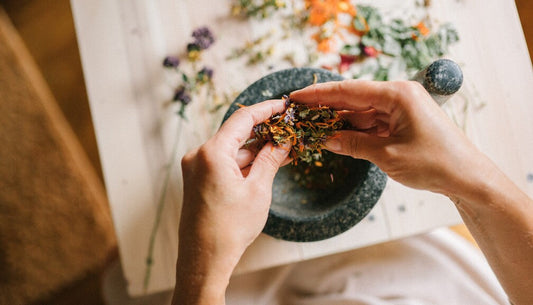Each dosha expresses balance and imbalance in different ways. Kaphas tend to be calm and relaxed when balanced but will lean toward lethargic and apathetic when out of balance. One of the important goals of Ayurveda is being able to tune into yourself and become aware of the signs that you are getting out of balance so that you can make shifts to restore your natural equilibrium.
In order to practice self-care, it’s important to recognize the signs of imbalance. Here’s a look at the expressions of Kapha, your predominant dosha, when in and out of balance.
A balanced Kapha feels …
Say yes to variety. Kapha types need to make a conscious effort to seek out new experiences. With their earthy, solid nature, Kaphas have a tendency to get stuck in ruts and stagnate, which can lead to depression and other health issues. By seeking out variety in life, you can spark your passion and channel your natural strength in ways that will expand your joy and love.
If you’re emerging from a long-standing pattern of inertia, you can start with small steps, such as taking a new route to work or accepting an invitation that you would normally decline. You may also surprise yourself by deciding to take a big leap into the unknown, such as booking a trip to a new destination or enrolling in an archery class. Experiment and see what works best for you.
Remember that what makes life truly stimulating isn’t external variety but the spark of awareness inside you. As your awareness expands, you let go of old conditioning that drives you to give too much, to hold on too tightly, or limit your possibilities. Meditation is one of the most powerful tools you have for cleansing the windows of perception and opening to new levels of awareness. Meditation helps Kaphas discover the underlying alertness in their nature and experience lightness of being.
Exercise every day. Physical activity is one of the best ways to avoid stagnation and the buildup of toxins in the body. Since Kapha creates a tendency for weight gain and lethargy, it’s especially important to exercise regularly and keep your energy flowing.
Kaphas have natural strength and endurance and can engage in a variety of high-intensity sports and physical activities. Find physical activities you enjoy and make them part of your daily routine. In the beginning, you may feel some resistance, but as you work out on a regular basis, you’ll find you look forward to the opportunity to move, breathe, and release the tension of the day.
Eat a Kapha-pacifying diet. Since Kaphas have a tendency to gain excess weight, it’s important to eat regular, balanced meals and not overindulge. Ayurveda recommends that Kaphas favor dry foods and those with an astringent or pungent taste, while minimizing sweet foods. Apples, dry toast, turmeric, and many raw vegetables will help prevent excess Kapha buildup and tone the digestive tract.
Try this: Drink hot ginger tea with your meals to help sharpen dulled taste buds and strengthen your digestive powers. Eating a teaspoon of whole fennel seeds after a meal will also help digestion. You can chew on the seeds like they are tiny mints.
Stay warm and avoid dampness. Kapha is especially sensitive to cold, damp conditions, so make sure your living and working environments are warm and dry. Also be careful not to expose your nose, throat, and lungs to cold winter air. Direct a sunlamp on your chest or use a heating pad under your back to help with excess Kapha.
Tip: To loosen congestion and ease a sore throat, make a delicious tea by boiling one-quarter teaspoon of dry ginger and turmeric in one cup of water.
Put your attention on joy. When Kapha is out of balance, you tend to feel depressed and dull. Instead of getting mired in mental sludge, focus your attention on joy. Ask yourself, “What brings me joy?” Make a list of the experiences that fill your heart with joy, such as reading a good book next to a cozy fire, painting a picture, sharing a deep conversation with a loved one, breathing in the scent of fresh pine trees, learning something new, or simply being. Keep adding to your list as your awareness expands, and choose at least one of the items on your list to experience each day.
As the author Robert Holden writes, “If you think something is missing in your life, it is probably you.” As you become more present in your life and pay attention to cultivating joy, you will naturally find yourself feeling energized, balanced, and healthy.
Not a Kapha? |
The Importance of Self-Care
Self-care is about making your own health and well-being a priority, and it’s essential for balancing all of the dosha types. If you neglect yourself and become depleted or ill, you won’t be able to fully express your love, creativity, and joy. Without good self-care, you will likely feel resentment and resistance. You may find yourself snapping at family members and co-workers or withdrawing to escape life’s demands.In order to practice self-care, it’s important to recognize the signs of imbalance. Here’s a look at the expressions of Kapha, your predominant dosha, when in and out of balance.
A balanced Kapha feels …
- Calm
- Relaxed
- Tolerant
- Forgiving
- Affectionate
- Steady
- Grounded
- Content
- Loyal
- Nurturing
- Devoted
- Patient
- Peaceful
- Empathetic
- Receptive
- Compassionate
- Lethargic
- Apathetic
- Dull
- Tired
- Withdrawn
- Depressed
- Stubborn
- “Clingy” or overly attached to possessions and relationships
- Stuck
- Insecure
Balancing Kapha With Stimulation and Movement
The key to Kapha self-care is stimulation and movement. While the slow and steady nature of Kapha creates dependability and strength, out-of-balance Kaphas cling too tightly to the status quo. They need the stimulation of new experiences, people, and events. They also need to move their bodies every day because without physical activity, Kaphas can become lethargic and dull. Since Kapha people move in and out of balance slowly it’s important to be steady about keeping this dosha in balance. Here are a few pointers that will help you balance Kapha.Say yes to variety. Kapha types need to make a conscious effort to seek out new experiences. With their earthy, solid nature, Kaphas have a tendency to get stuck in ruts and stagnate, which can lead to depression and other health issues. By seeking out variety in life, you can spark your passion and channel your natural strength in ways that will expand your joy and love.
If you’re emerging from a long-standing pattern of inertia, you can start with small steps, such as taking a new route to work or accepting an invitation that you would normally decline. You may also surprise yourself by deciding to take a big leap into the unknown, such as booking a trip to a new destination or enrolling in an archery class. Experiment and see what works best for you.
Remember that what makes life truly stimulating isn’t external variety but the spark of awareness inside you. As your awareness expands, you let go of old conditioning that drives you to give too much, to hold on too tightly, or limit your possibilities. Meditation is one of the most powerful tools you have for cleansing the windows of perception and opening to new levels of awareness. Meditation helps Kaphas discover the underlying alertness in their nature and experience lightness of being.
Exercise every day. Physical activity is one of the best ways to avoid stagnation and the buildup of toxins in the body. Since Kapha creates a tendency for weight gain and lethargy, it’s especially important to exercise regularly and keep your energy flowing.
Kaphas have natural strength and endurance and can engage in a variety of high-intensity sports and physical activities. Find physical activities you enjoy and make them part of your daily routine. In the beginning, you may feel some resistance, but as you work out on a regular basis, you’ll find you look forward to the opportunity to move, breathe, and release the tension of the day.
Eat a Kapha-pacifying diet. Since Kaphas have a tendency to gain excess weight, it’s important to eat regular, balanced meals and not overindulge. Ayurveda recommends that Kaphas favor dry foods and those with an astringent or pungent taste, while minimizing sweet foods. Apples, dry toast, turmeric, and many raw vegetables will help prevent excess Kapha buildup and tone the digestive tract.
Try this: Drink hot ginger tea with your meals to help sharpen dulled taste buds and strengthen your digestive powers. Eating a teaspoon of whole fennel seeds after a meal will also help digestion. You can chew on the seeds like they are tiny mints.
Stay warm and avoid dampness. Kapha is especially sensitive to cold, damp conditions, so make sure your living and working environments are warm and dry. Also be careful not to expose your nose, throat, and lungs to cold winter air. Direct a sunlamp on your chest or use a heating pad under your back to help with excess Kapha.
Tip: To loosen congestion and ease a sore throat, make a delicious tea by boiling one-quarter teaspoon of dry ginger and turmeric in one cup of water.
Put your attention on joy. When Kapha is out of balance, you tend to feel depressed and dull. Instead of getting mired in mental sludge, focus your attention on joy. Ask yourself, “What brings me joy?” Make a list of the experiences that fill your heart with joy, such as reading a good book next to a cozy fire, painting a picture, sharing a deep conversation with a loved one, breathing in the scent of fresh pine trees, learning something new, or simply being. Keep adding to your list as your awareness expands, and choose at least one of the items on your list to experience each day.
As the author Robert Holden writes, “If you think something is missing in your life, it is probably you.” As you become more present in your life and pay attention to cultivating joy, you will naturally find yourself feeling energized, balanced, and healthy.






















